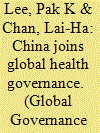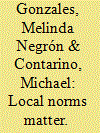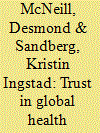|
|
|
Sort Order |
|
|
|
Items / Page
|
|
|
|
|
|
|
| Srl | Item |
| 1 |
ID:
130707


|
|
|
|
|
| Publication |
2014.
|
| Summary/Abstract |
In the wake of China's rapid ascendancy, are there any new rules made by the country in global health governance? This article examines China's emerging role in the Agreement on Trade Related Aspects of Intellectual Property Rights and finds that China adopts a pro-status quo stance on patented medicines. Aspiring to develop its own pharmaceutical sector to be capable to produce patented medicines on a par with the West, it has little appetite for using the prevailing rules or making new rules that are to the liking of the developing world. Undoubtedly, China is a new player in global health governance but has yet to have agenda-setting intent and capacity. This article argues that China's behavior and preferences can be explained by its dualistic national identities, the dominant position of realism in both the study of international relations and policy circles, and an underdevelopment of epistemic community in global health governance in the country.
|
|
|
|
|
|
|
|
|
|
|
|
|
|
|
|
| 2 |
ID:
130705


|
|
|
|
|
| Publication |
2014.
|
| Summary/Abstract |
Most states have embraced the emerging Responsibility to Protect norm, which was adopted by the UN General Assembly in 2005. R2P obliges states to prevent atrocity crimes within their own borders and not to turn a blind eye when they occur elsewhere. However, R2P's third pillar, which permits UN Security Council-authorized coercive actions, has been controversial. A few states have rejected R2P, fearing that the third pillar might be misused, while others have localized R2P (adapting it to their own preferences) or have sought to modify it globally through feedback in continuing UN discussions. This article explains the range of responses to the third pillar of R2P and explores why states employ different types of feedback, ranging from soft feedback (which seeks to build broader support for R2P) to hard feedback (which seeks to limit R2P). The article concludes that feedback reflects both national strategic concerns and preexisting local norms. Prior normative commitments to human rights and humanitarianism reduce the incidence of hard feedback whereas normative commitments to anti-imperialism and noninterference increase the likelihood of feedback seeking to constrain R2P. States with mixed commitments (e.g., to both human rights and to anti-imperialism) may offer complex, even contradictory, feedback, reflecting a prevailing national norm hierarchy, changes to which could result in changed state responses to R2P.
|
|
|
|
|
|
|
|
|
|
|
|
|
|
|
|
| 3 |
ID:
130708


|
|
|
|
|
| Publication |
2014.
|
| Summary/Abstract |
The Global Alliance for Vaccines and Immunization provides a most interesting example of effective cooperation between international organizations-especially the World Health Organization, the UN Children's Fund, and the World Bank. Based on extensive research and interviews, this article examines how and why this cooperation came about. The role of the Gates Foundation in providing massive financial support was certainly crucial. An adequate explanation must, however, involve more than what might be called "buying cooperation"; trust played a crucial role. By studying this particular case in detail, this article raises some interesting theoretical issues about the role of trust in global governance.
|
|
|
|
|
|
|
|
|
|
|
|
|
|
|
|
|
|
|
|
|